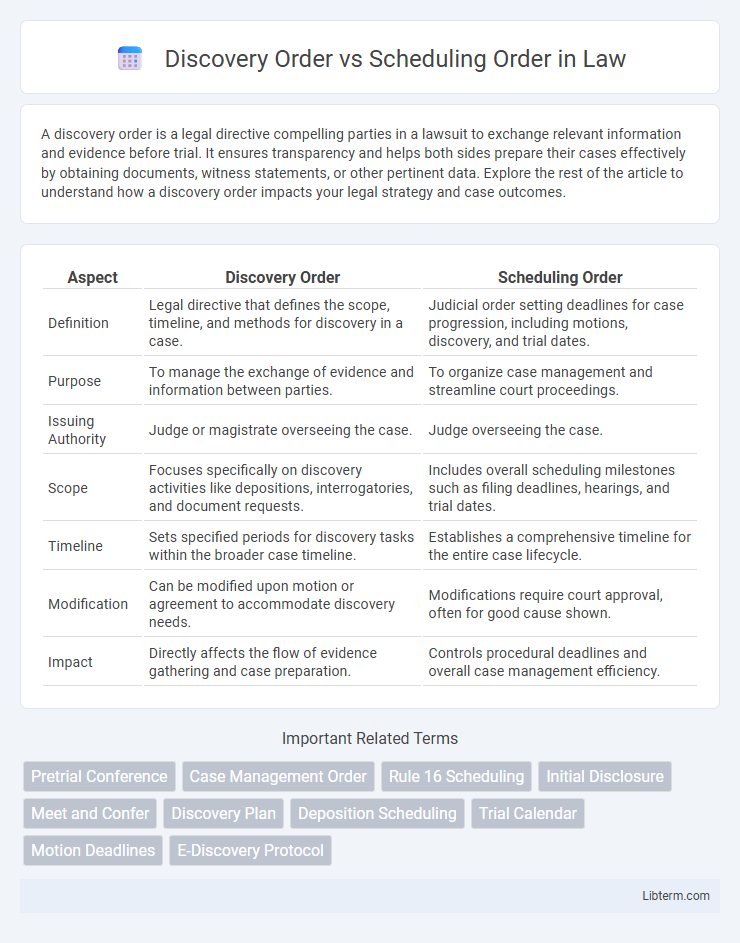A discovery order is a legal directive compelling parties in a lawsuit to exchange relevant information and evidence before trial. It ensures transparency and helps both sides prepare their cases effectively by obtaining documents, witness statements, or other pertinent data. Explore the rest of the article to understand how a discovery order impacts your legal strategy and case outcomes.
Table of Comparison
| Aspect | Discovery Order | Scheduling Order |
|---|---|---|
| Definition | Legal directive that defines the scope, timeline, and methods for discovery in a case. | Judicial order setting deadlines for case progression, including motions, discovery, and trial dates. |
| Purpose | To manage the exchange of evidence and information between parties. | To organize case management and streamline court proceedings. |
| Issuing Authority | Judge or magistrate overseeing the case. | Judge overseeing the case. |
| Scope | Focuses specifically on discovery activities like depositions, interrogatories, and document requests. | Includes overall scheduling milestones such as filing deadlines, hearings, and trial dates. |
| Timeline | Sets specified periods for discovery tasks within the broader case timeline. | Establishes a comprehensive timeline for the entire case lifecycle. |
| Modification | Can be modified upon motion or agreement to accommodate discovery needs. | Modifications require court approval, often for good cause shown. |
| Impact | Directly affects the flow of evidence gathering and case preparation. | Controls procedural deadlines and overall case management efficiency. |
Introduction to Discovery Order and Scheduling Order
Discovery order defines the sequence and scope of exchanging information between parties in litigation, aiming to organize evidence gathering efficiently. Scheduling order sets key deadlines and procedural milestones throughout the case, ensuring timely progression from discovery through trial. Both orders streamline case management but target different aspects of legal procedure: discovery order focuses on the flow of information, while scheduling order governs the overall timeline.
Defining Discovery Order in Legal Proceedings
A Discovery Order in legal proceedings mandates the exchange of relevant information and evidence between parties to ensure fair preparation for trial, specifying the scope, timing, and method of disclosure. It governs the process of obtaining documents, depositions, interrogatories, and admissions to prevent surprises and promote transparency. This order is distinct from a Scheduling Order, which primarily sets deadlines for case milestones rather than detailing discovery protocols.
What is a Scheduling Order?
A scheduling order is a court-issued timeline that sets deadlines for various phases of a lawsuit, including discovery, motions, and trial dates, ensuring the case progresses efficiently. It outlines specific dates for filing pleadings, completing discovery, and other pretrial activities, helping to manage the flow of litigation. This order assists judges and parties in maintaining organized case management and prevents unnecessary delays.
Purpose and Importance of Discovery Orders
Discovery Orders establish the scope, deadlines, and methods for exchanging evidence between parties, ensuring a structured and efficient pre-trial process critical to case preparation. These orders prevent disputes by clearly defining what information must be disclosed, thereby promoting fairness and transparency in litigation. Scheduling Orders complement this framework by setting overall timelines for the entire case progression, but Discovery Orders specifically govern the important procedural details of evidence exchange.
Functions and Objectives of Scheduling Orders
Scheduling orders primarily establish a clear timeline for pretrial activities, ensuring deadlines for discovery, motions, and hearings are set to streamline case management. These orders coordinate the sequence and duration of discovery phases, allocating resources efficiently and preventing delays in the litigation process. By defining procedural steps, scheduling orders promote judicial economy and enhance the predictability of case progression toward trial.
Key Differences Between Discovery and Scheduling Orders
Discovery orders outline the process and deadlines for exchanging evidence and information between parties in litigation, ensuring all relevant facts are disclosed before trial. Scheduling orders establish the overall timeline for a case, setting key dates such as motions deadlines, pretrial conferences, and trial dates to manage court proceedings efficiently. The key difference lies in their focus: discovery orders regulate evidence collection while scheduling orders organize the entire litigation workflow.
Impact of Discovery and Scheduling Orders on Case Management
Discovery orders streamline the exchange of evidence by setting clear timelines and delineating the scope of information sharing, directly reducing delays and fostering efficient case progression. Scheduling orders establish firm deadlines for key procedural milestones, including motions, hearings, and trial dates, which enhances court resource allocation and minimizes prolonged litigation. Together, these orders provide a structured framework that improves case management by promoting accountability and predictability throughout the litigation process.
Common Issues and Challenges Involving Discovery and Scheduling Orders
Discovery orders often face challenges such as ambiguous scope, delays in document production, and disputes over relevance or privilege, which can lead to extended litigation timelines. Scheduling orders commonly encounter issues including unrealistic deadlines, insufficient accommodations for complex cases, and frequent requests for extensions that disrupt court calendars. Effective management of both orders requires clear communication, precise deadlines, and proactive resolution of disputes to minimize procedural delays.
Modifying or Enforcing Discovery and Scheduling Orders
Modifying or enforcing discovery and scheduling orders requires strict adherence to the court's procedural rules, ensuring that deadlines and obligations are adjusted only for good cause and with judicial approval. Courts may modify discovery orders to accommodate unforeseen circumstances, such as new evidence or changes in case complexity, while enforcing strict compliance to maintain case progression. Scheduling orders are similarly adjusted through motions demonstrating the necessity for extensions or alterations, balancing efficiency and fairness in case management.
Best Practices for Navigating Discovery and Scheduling Orders
Effective management of Discovery Orders and Scheduling Orders hinges on clear communication and meticulous documentation to ensure compliance with court deadlines. Prioritizing early identification of key issues and coordinating deposition timelines within the Scheduling Order minimizes conflicts and streamlines the discovery process. Maintaining flexibility to amend orders as new information emerges supports thorough preparation and reduces the risk of sanctions or delays.
Discovery Order Infographic

 libterm.com
libterm.com